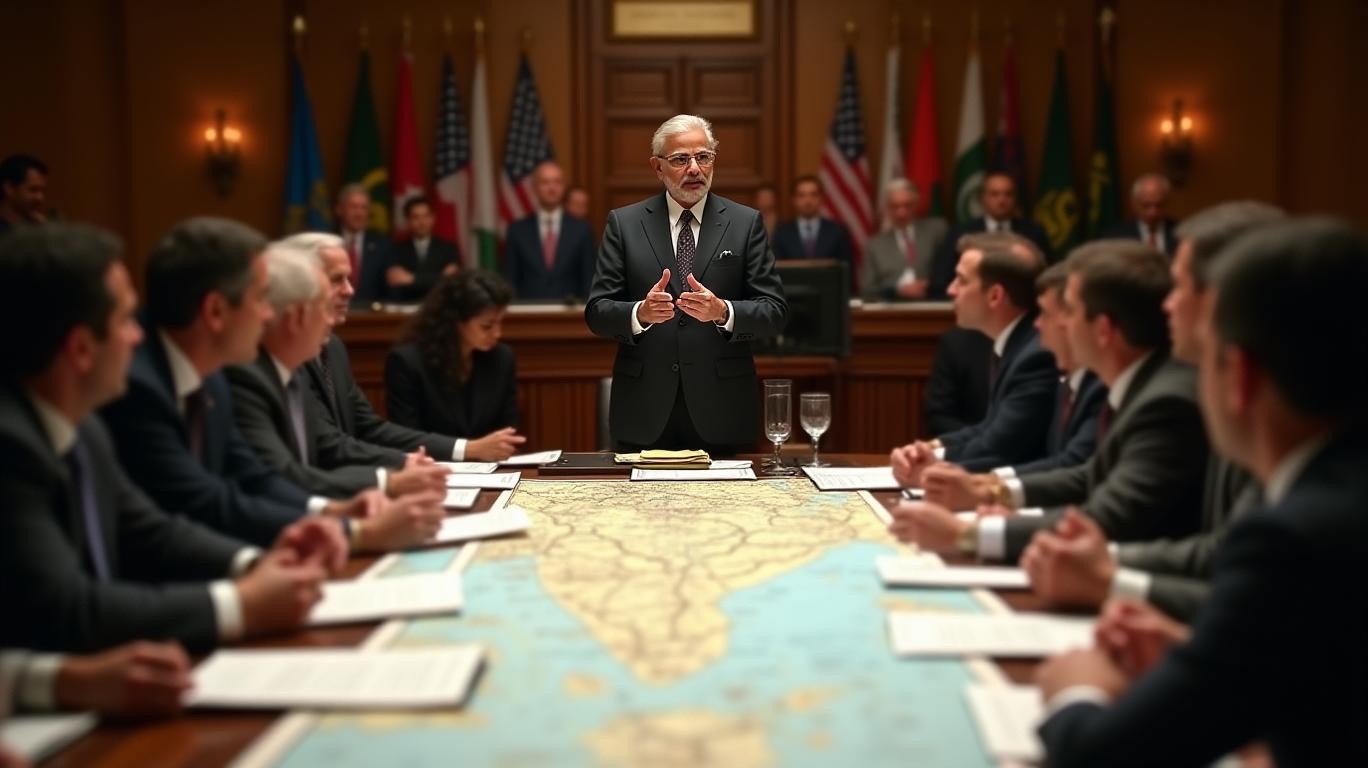U.S. House Committee Slams NYT Report on Pahalgam Attack, Calls it 'Terrorist Attack'
ByAinvest
Thursday, Apr 24, 2025 9:48 pm ET2min read
CMS--
In response to this deadly attack, India has suspended the Indus Water Treaty with Pakistan. The treaty, signed in 1960, governs the sharing of water from the Indus River System between the two countries. India has also downgraded its diplomatic ties with Pakistan and expelled Pakistani officials, including declaring them as Persona Non Grata and ordering them to leave India within a week. Additionally, India has canceled visas provided under the SAARC Visa Exemption Scheme (SVES) and ordered Pakistan to leave the country within 48 hours [1].
The US House Committee on Foreign Affairs has criticized a New York Times report on the attack, arguing that the NYT used the term "militant attack" instead of "terrorist attack." The committee contends that the NYT is "removed from reality" when it comes to terrorism, regardless of the country involved. The committee's stance reflects a broader geopolitical context where India and Pakistan have long-standing tensions, exacerbated by cross-border terrorism.
The Indus Water Treaty, which was brokered by the World Bank, has been a contentious issue between India and Pakistan. The treaty allocates 20% of the water from the Indus River System to India and 80% to Pakistan. India can use the water from the western rivers for domestic, non-consumptive use such as storage, irrigation, and electricity generation. Pakistan, however, has accused India of blocking water in the past and has taken the matter to the United Nations [2].
The suspension of the Indus Water Treaty and the downgrading of diplomatic ties are significant moves that could have far-reaching implications for regional stability and economic relations between India and Pakistan. The decision to hold the treaty in abeyance until Pakistan credibly and irrevocably abjures its support for cross-border terrorism is a strategic response to the recent attack. However, the long-term impact of these actions remains to be seen.
References:
[1] https://economictimes.indiatimes.com/news/india/sc-condemns-terrorist-attack-in-pahalgam-observes-2-minute-silence/articleshow/120579792.cms
[2] https://www.timesnownews.com/india/india-stops-water-sharing-agreement-with-pakistan-what-is-indus-waters-treaty-after-deadly-pahalgam-jammu-kashmir-attack-article-151481338
NYT--
V--
WAT--
The US House Committee of Foreign Affairs has criticized a New York Times report on the Pahalgam attack, labeling it a "terrorist attack" rather than "militant attack" as stated in the report. The committee argues that the NYT is "removed from reality" when it comes to terrorism, regardless of the country involved. India has suspended the Indus Water Treaty and downgraded diplomatic ties with Pakistan, while Pakistan has suspended trade and closed its airspace for Indian airlines in response.
The Supreme Court of India has strongly condemned the terrorist attack on tourists in Pahalgam, Jammu and Kashmir, and the nation is taking significant measures in response to the incident. The attack, which occurred on Tuesday, resulted in the deaths of 25 Indian nationals and one Nepali citizen, with several others injured. The terrorists targeted tourists at Baisaran meadow in Pahalgam, reportedly asking them to recite Islamic verses before shooting those who couldn't comply.In response to this deadly attack, India has suspended the Indus Water Treaty with Pakistan. The treaty, signed in 1960, governs the sharing of water from the Indus River System between the two countries. India has also downgraded its diplomatic ties with Pakistan and expelled Pakistani officials, including declaring them as Persona Non Grata and ordering them to leave India within a week. Additionally, India has canceled visas provided under the SAARC Visa Exemption Scheme (SVES) and ordered Pakistan to leave the country within 48 hours [1].
The US House Committee on Foreign Affairs has criticized a New York Times report on the attack, arguing that the NYT used the term "militant attack" instead of "terrorist attack." The committee contends that the NYT is "removed from reality" when it comes to terrorism, regardless of the country involved. The committee's stance reflects a broader geopolitical context where India and Pakistan have long-standing tensions, exacerbated by cross-border terrorism.
The Indus Water Treaty, which was brokered by the World Bank, has been a contentious issue between India and Pakistan. The treaty allocates 20% of the water from the Indus River System to India and 80% to Pakistan. India can use the water from the western rivers for domestic, non-consumptive use such as storage, irrigation, and electricity generation. Pakistan, however, has accused India of blocking water in the past and has taken the matter to the United Nations [2].
The suspension of the Indus Water Treaty and the downgrading of diplomatic ties are significant moves that could have far-reaching implications for regional stability and economic relations between India and Pakistan. The decision to hold the treaty in abeyance until Pakistan credibly and irrevocably abjures its support for cross-border terrorism is a strategic response to the recent attack. However, the long-term impact of these actions remains to be seen.
References:
[1] https://economictimes.indiatimes.com/news/india/sc-condemns-terrorist-attack-in-pahalgam-observes-2-minute-silence/articleshow/120579792.cms
[2] https://www.timesnownews.com/india/india-stops-water-sharing-agreement-with-pakistan-what-is-indus-waters-treaty-after-deadly-pahalgam-jammu-kashmir-attack-article-151481338

Stay ahead of the market.
Get curated U.S. market news, insights and key dates delivered to your inbox.
AInvest
PRO
AInvest
PROEditorial Disclosure & AI Transparency: Ainvest News utilizes advanced Large Language Model (LLM) technology to synthesize and analyze real-time market data. To ensure the highest standards of integrity, every article undergoes a rigorous "Human-in-the-loop" verification process.
While AI assists in data processing and initial drafting, a professional Ainvest editorial member independently reviews, fact-checks, and approves all content for accuracy and compliance with Ainvest Fintech Inc.’s editorial standards. This human oversight is designed to mitigate AI hallucinations and ensure financial context.
Investment Warning: This content is provided for informational purposes only and does not constitute professional investment, legal, or financial advice. Markets involve inherent risks. Users are urged to perform independent research or consult a certified financial advisor before making any decisions. Ainvest Fintech Inc. disclaims all liability for actions taken based on this information. Found an error?Report an Issue

Comments
No comments yet